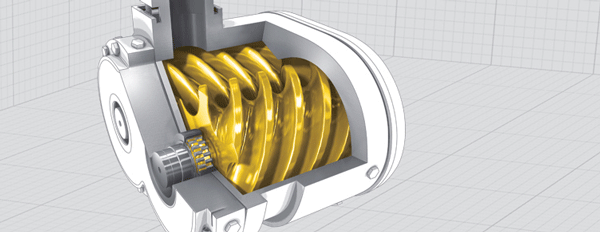Rotary Compressors: Importance Of Lubricants
Air compressors are a vital part of many industries, such as Automotive, Electronics, Food & beverage, Medical, Mining, Manufacturing, etc. In general, there are three types of compressors: reciprocating, rotary centrifugal and rotary screw compressors. All three types differ in features, such as number of compression stages, cooling method, drive method, lubrication, etc. For example, compressors can be classified in terms whether they use air, water or oil as a cooling method. Rotary screw compressors, also known as rotary compressors, are the most commonly used compressors due to the fact that they are positive displacement type of compressors.
The most popular rotary compressors are the spiral lobe oil flooded screw compressors and single stage helical screw compressor. Both types use two built-in rotors which compress the air internally. Rotary screw compressors do not use valves and they are usually oil cooled, using either air or water cooled oil coolers. The cooling process takes place inside compressors, which means the working parts never get in contact with extreme operating temperatures. So, rotary compressor is a continuous duty air or water cooled compressor type.

Rotary compressors are easy to operate but require regular maintenance. They achieve capacity control by the variable speed and variable displacement. The advantages of the simple operation of rotary screw compressors are production of smooth air output in a compact size with high output volume and long service life. The most important component of rotary compressors is the lubricant. Lubricant used for compressors is crucial for maintaining compressors vitality and strong performance. Most compressor lubricants are especially formulated to battle the harsh compression elements and maximize compressors’ efficiency and longevity.
When using rotary compressors, operators may experience a lot of challenges, such as operating in extreme temperatures, unusual high oil consumption, severe air intake environment, air system material degradation and high maintenance costs. These are usually consequences of using non-genuine compressor lubricant and can easily lead to breakdown of the lubricant and all critical components, oxidation, increased energy consumption, cracking of air system material and even to complete rotary compressor failure. To avoid these fatal and costly situations, it is extremely important users to use lubricants that meet the specific compressing needs of the compressor and application.
Maximizing the performance of rotary compressors and extending their service life depends on using the right lubricant to a significant extent. The right lubricant is the one that perfectly meets the rotary compressor, individual application and environment. By using the right compressor lubricants, users will never experience major problems or compressor failure.



